 W
WAn Apology for the Life of Mrs. Shamela Andrews, or simply Shamela, as it is more commonly known, is a satirical burlesque novella by English writer Henry Fielding. It was first published in April 1741 under the name of Mr. Conny Keyber. Fielding never admitted to writing the work, but it is widely considered to be his. It is a direct attack on the then-popular novel Pamela (1740) by Fielding's contemporary and rival Samuel Richardson and is composed, like Pamela, in epistolary form.
 W
WBarack the Barbarian is a comic book series published by Devil's Due Publishing beginning in June 2009. It was written by Larry Hama, with art by Christopher Schons.
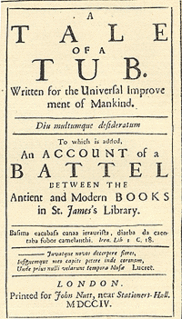 W
W"The Battle of the Books" is the name of a short satire written by Jonathan Swift and published as part of the prolegomena to his A Tale of a Tub in 1704. It depicts a literal battle between books in the King's Library, as ideas and authors struggle for supremacy. Because of the satire, "The Battle of the Books" has become a term for the Quarrel of the Ancients and the Moderns. It is one of his earliest well-known works.
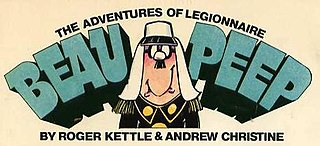 W
WBeau Peep was a popular British comic strip written by Roger Kettle and illustrated by Andrew Christine. The strip features the misadventures of the eponymous lead character, Beau Peep, an inept and cowardly British man who joins the tough and hardy French Foreign Legion in the deserts of North Africa to escape his terrifying wife Doris back home. There are also numerous surreal supporting characters.
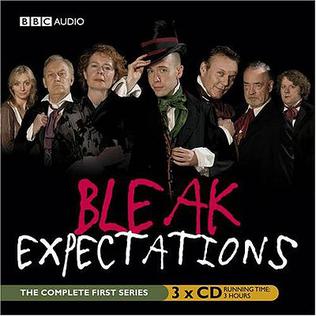 W
WBleak Expectations is a BBC Radio 4 comedy series that premièred in August 2007. It is a pastiche of the works of Charles Dickens – such as Bleak House and Great Expectations, from which it derives its name – as well as adventure, science fiction and costume dramas set in the same period, and parodies several of their plot devices, whilst simultaneously tending toward a highly surreal humour along the lines of The Goon Show. The series has also demonstrated a fondness for allusions to and parodies of the films of Alec Guinness, particularly the Edwardian satire Kind Hearts and Coronets.
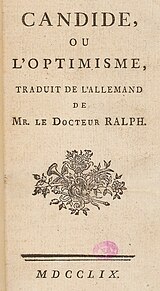 W
WCandide, ou l'Optimisme is a French satire first published in 1759 by Voltaire, a philosopher of the Age of Enlightenment. The novella has been widely translated, with English versions titled Candide: or, All for the Best (1759); Candide: or, The Optimist (1762); and Candide: Optimism (1947). It begins with a young man, Candide, who is living a sheltered life in an Edenic paradise and being indoctrinated with Leibnizian optimism by his mentor, Professor Pangloss. The work describes the abrupt cessation of this lifestyle, followed by Candide's slow and painful disillusionment as he witnesses and experiences great hardships in the world. Voltaire concludes Candide with, if not rejecting Leibnizian optimism outright, advocating a deeply practical precept, "we must cultivate our garden", in lieu of the Leibnizian mantra of Pangloss, "all is for the best" in the "best of all possible worlds".
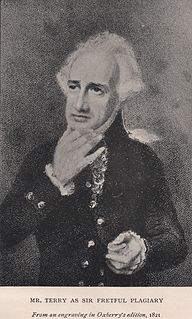 W
WThe Critic: or, a Tragedy Rehearsed is a satire by Richard Brinsley Sheridan. It was first staged at Drury Lane Theatre in 1779. It is a burlesque on stage acting and play production conventions, and Sheridan considered the first act to be his finest piece of writing. One of its major roles, Sir Fretful Plagiary, is a comment on the vanity of authors, and in particular a caricature of the dramatist Richard Cumberland who was a contemporary of Sheridan.
 W
WCrock is an American comic strip created by Bill Rechin and Brant Parker depicting the French Foreign Legion. Distributed by King Features Syndicate, the strip began in 1975 and ended in May 2012. As of January 2012, it appeared in 250 newspapers in 14 countries.
 W
WThe Firesign Theatre's Box of Danger: The Complete Nick Danger Casebook is a four-CD boxed set of most recorded material by comedy group the Firesign Theatre containing their fictional character Nick Danger, portrayed by Phil Austin. Danger is a parody of the hard-boiled detective genre, and is often announced as "Nick Danger, Third Eye", a parody of the term private eye. Danger stories involve stereotypical film noir situations, including mistaken identity, betrayal, and femme fatales. Danger originally appeared on the 1969 album How Can You Be in Two Places at Once When You're Not Anywhere at All, and was reprised in various live shows, radio appearances and albums, including the 1979 Nick Danger: The Case of the Missing Shoe, 1984 The Three Faces of Al, and 2001 The Bride of Firesign.
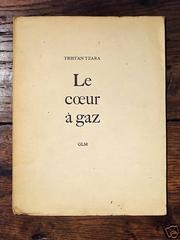 W
WThe Gas Heart or The Gas-Operated Heart is a French-language play by Romanian-born author Tristan Tzara. It was written as a series of non sequiturs and a parody of classical drama—it has three acts despite being short enough to qualify as a one-act play. A part-musical performance that features ballet numbers, it is one of the most recognizable plays inspired by the anti-establishment trend known as Dadaism. The Gas Heart was first staged in Paris, as part of the 1921 "Dada Salon" at the Galerie Montaigne.
 W
W"Haddocks' Eyes" is a song sung by The White Knight from Lewis Carroll's 1871 novel Through the Looking-Glass, chapter VIII.
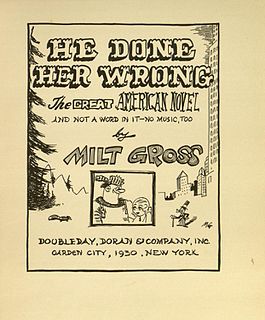 W
WHe Done Her Wrong is a wordless novel written by American cartoonist Milt Gross and published in 1930. It was not as successful as some of Gross's earlier works, notably his book Nize Baby (1926) based on his newspaper comic strips. He Done Her Wrong has been reprinted in recent years and is now recognized as a comic parody of other similar wordless novels of the early 20th century, as well as an important precursor to the modern graphic novel.
 W
WThe Knight of the Burning Pestle is a play in five acts by Francis Beaumont, first performed at Blackfriars Theatre in 1607 and published in a quarto in 1613. It is the earliest whole parody play in English. The play is a satire on chivalric romances in general, similar to Don Quixote, and a parody of Thomas Heywood's The Four Prentices of London and Thomas Dekker's The Shoemaker's Holiday. It breaks the fourth wall from its outset.
 W
WMonty Python and the Holy Grail is a 1975 British comedy film inspired by the Arthurian legend, written and performed by the Monty Python comedy group, directed by Gilliam and Jones. It was conceived during the hiatus between the third and fourth series of their BBC television series Monty Python's Flying Circus.
 W
WNightmare Abbey is an 1818 novella by Thomas Love Peacock which makes good-natured fun of contemporary literary trends.
 W
WNorthanger Abbey is a coming-of-age novel and a satire of Gothic novels written by Jane Austen. Austen was also influenced by Charlotte Lennox's The Female Quixote (1752). Northanger Abbey was completed in 1803, the first of Austen's novels completed in full, but was published posthumously in 1817 with Persuasion. The story concerns Catherine Morland, the naïve young protagonist, and her journey to a better understanding of herself and of the world around her. How Catherine views the world has been distorted by her fondness for Gothic novels and an active imagination.
 W
WEdgar Allan Poe's poem "The Raven" has been frequently referenced and parodied in contemporary culture. Immediately popular after the poem's publication in 1845, it quickly became a cultural phenomenon. Some consider it the best poem ever written. As such, modern references to the poem continue to appear in popular culture.
 W
WRejected Addresses was the title of an 1812 book of parodies by the brothers James and Horace Smith. In the line of 18th century pastiches focussed on a single subject in the style of poets of the time, it contained twenty-one good-natured pastiches of contemporary authors. The book's popular success set the fashion for a number of later works of the same kind.
 W
W"St. George and the Dragonet" is a short audio satire recorded August 26, 1953 by Stan Freberg for Capitol Records. It was released September 21, 1953 as a 45 rpm single, and reached No. 1 on both the Billboard and Cash Box record charts.
 W
W"Went with the Wind!" is a comedy sketch featured on the eighth episode of the tenth season of The Carol Burnett Show. It originally aired in the United States on CBS on November 13, 1976, and is a parody of the 1939 American historical drama film Gone with the Wind. The sketch was written by two young writers, Rick Hawkins and Liz Sage. In 2009, TV Guide ranked the sketch #53 on its list of "Top 100 Episodes of All Time".
 W
WZorry Kid is the title character of an Italian comic series created by Benito Jacovitti.